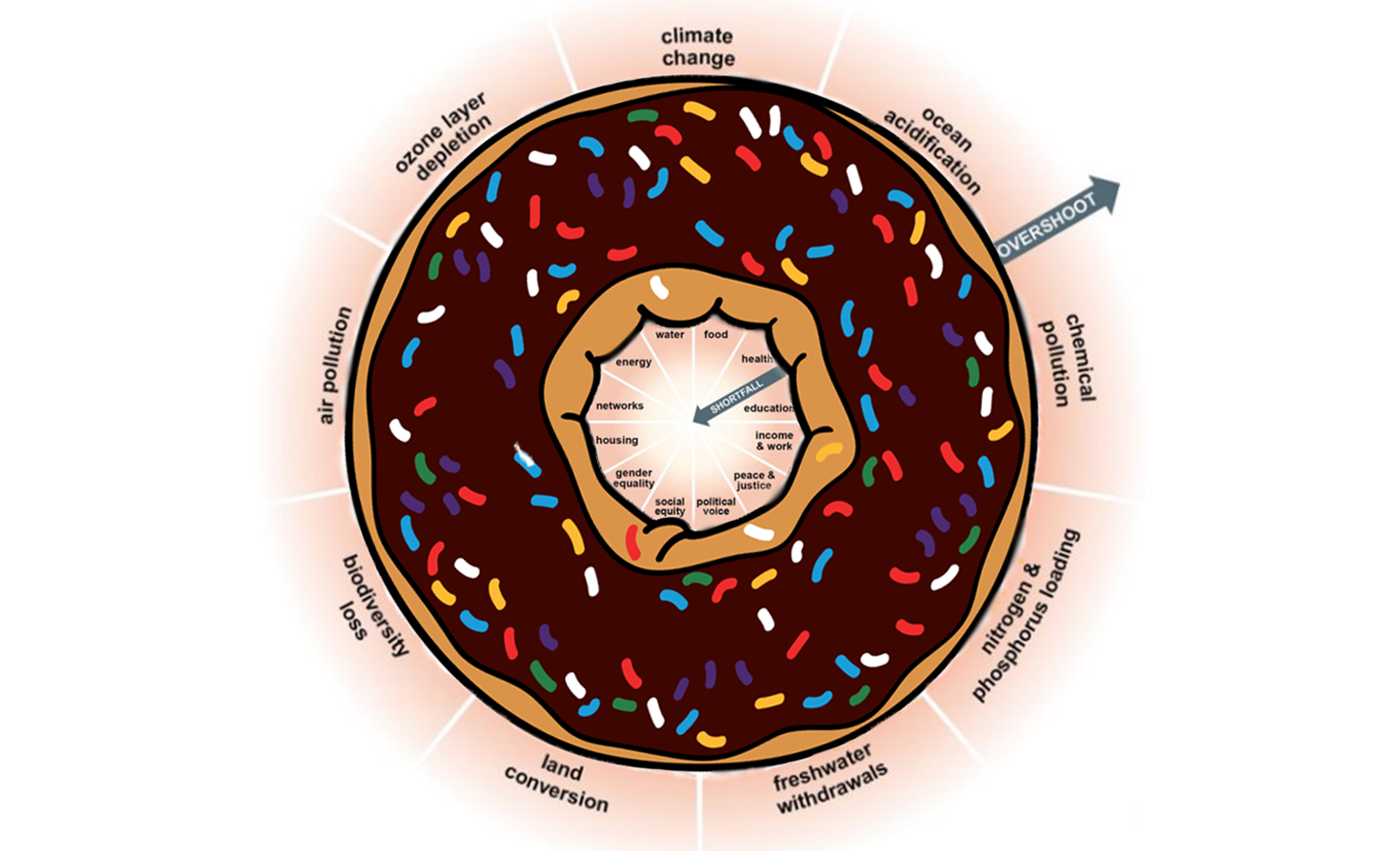Having this Doughnut Can Change Our World. For Good.
Yes, a doughnut is changing our world.
And it’s not whether or not indulging in doughnuts can make us live longer (or shorter). It's the shape of the doughnut that's changing the world.
That shape has led to a branch of economics called Doughnut Economics. And it really is a world-changing idea.
Let’s look at how relevant this new economic model is to ALL of us.
First, what’s Doughnut Economics?
In a recent article in Times, Amsterdam was mentioned as the city that decided to experiment with the very concept of doughnut economics. It’s an economic model that balances essential human needs and planetary boundaries.
For you to understand the model, let me first share this video of the originator of Doughnut Economics, Oxford AND Cambridge Professor, Kate Raworth.
Kate explains that the word 'economics' actually means ‘household management’. So, she posits that the purpose of economics is to help us effectively manage our household. Today, our household is bigger than just our own home. Our entire planet — where we live and where our businesses, communities, and societies thrive — is essentially our 'household'.
So, the deeper understanding of how to manage our 'household' sustainably — to prosper and thrive without seeing major disruptions and damages — is very much at the heart of today’s economics debates.
So, why doughnut…?
I said it was the shape of the doughnut that mattered.
In this simple (yet very logical) economics model, the doughnut is the shape in which we can contain the prosperity bandwidth of everyone who belongs to the household.

If we have people who are left out in the hole of the doughnut (meaning they are living below a certain level of living standard), our society will have continuous challenges. In that society, some children are not given the opportunity to learn and gain valuable skills, and some people with disabilities or other disadvantages are left behind. In that same society, problems such as unemployment, crimes, drug addiction, depression, homelessness, and domestic violence could be prevalent.
More divisiveness and discrimination can spread. People may not trust each other easily. Living in this place can become a matter of survival for many. Everyone tries not to be left in the hole just by being unlucky or picked by bullies. But if someone else is in it, we ignore the fact that there is a hole.
This is, you’ll realize, our reality today.
Nearly 10% of the world’s population still live on less than $1.90 a day. But wait - $1.90 a day as the poverty line is actually ridiculous. If someone lives on $2 a day, the person is no longer poor…? No wonder our current economic models are not working well.
But at the same time, simply eliminating poverty and discrimination cannot transform the world into a truly effective household management model. Because there is the other side we also need to consider.
Today, it’s possible for a person or a company to amass a vast fortune. But to make the world truly sustainable long-term, we also need to be able to cap our prosperity to a certain degree. If there is no boundary to the upper end of our prosperity, we also see new challenges emerging. And this is not only about some mega-rich people and their lifestyles. We are all playing a part in the economic model whereby ‘having and accruing much more than needed’ and ‘convenience first’ thinking is encouraged.
We’ve already seen it - the environmental distraction, shrinking natural biodiversity, decimated rainforests that are supposed to create clean air for us all and reduce the carbon dioxide in the air… With the unlimited pursuit of ‘prosperity at all cost’, we see the temperature of the world inching up, causing the glaciers to melt and many islands to be submerged in the sea.
So, what do we do now?

The good news is that places like Amsterdam are already trialing the idea. They aim to integrate Doughnut Economics and bring all their 872,000 residents inside the doughnut, ensuring everyone has access to a good quality of life without putting more pressure on the planet than is sustainable.
As the model proves to improve the quality of its residents, other cities and communities can gradually follow the example.
But…this change might not happen fast enough to counteract the effect of global warming, the accompanying surge of powerful natural disasters, growing social unrest, and conflicts around the world. We might experience irreversible damage before cities and nations change for us.
So, instead of waiting for the world to change, you can choose to create your own doughnut effect.
Here are some examples of things you can start doing easily, right away:
Use Less
Cut back on your consumption and disposal a little bit. You can do it in a way that’s still joyful, so you don’t feel judgmental about those who are spending or wasting more. Doing it joyfully is key to inspiring others to do it too.
Give Some
No matter how much or little you have - whether it is money, time, knowledge, and energy, you can simply give some to those you can help. If you are not worried about the size of the gift you can give, you can give now and at any time.
Plan for Long-term Abundance
When you think longer-term, you make decisions that are better for you and for others. What kind of environment do you want to live in, in 10- or 20-years’ time? What kind of world do you want your children and grandchildren to experience? If you think long-term, you probably consume a little less, invest in your education, relationships, and wellbeing.
Expand Your ‘Household’
When we see the purpose of our economic development as only for our own family household or community, we settle with business practices that can undermine the wellbeing of people in other parts of the world. Of course, we choose products that are the cheapest even if they may involve some unethical practices. But if we expand the perceived boundary of our household, we’d likely make different decisions. We don't need to become an activist to care for our own global family. We can be simply more interested and perhaps a little kinder.
Enjoying All Doughnut Flavors

Just like the fact that everyone likes different flavors of doughnuts (and some may not even like doughnuts at all), people in the world happen to be unique and different in many ways.
Having different opinions, believing in different religions, or coming from different parts of the world are not dividing factors for humanity. People with different tastes and ideas are not our enemies. They are unique gifts (and varying flavors) to our world just like you are.
With those differences in place, we can achieve more together. We have the collective power to overcome all challenges in our doughnut world.
One day we may find ourselves living in the real doughnut economy.
Right now, it’s a choice we make and enjoy. Everyday.
